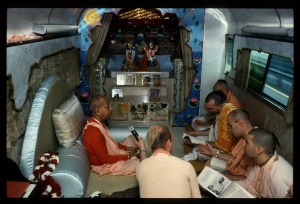CC Madhya 22.85: Difference between revisions
m (1 revision(s)) |
No edit summary |
||
| Line 1: | Line 1: | ||
{{ | [[Category:Sri Caitanya-caritamrta - Madhya-lila Chapter 22|C085]] | ||
<div style="float:left">'''[[Sri Caitanya-caritamrta|Śrī Caitanya-caritāmṛta]] - [[CC Madhya|Madhya-līlā]] - [[CC Madhya 22|Chapter 22: The Process of Devotional Service]]'''</div> | |||
<div style="float:right">[[File:Go-previous.png|link=CC Madhya 22.84|Madhya-līlā 22.84]] '''[[CC Madhya 22.84|Madhya-līlā 22.84]] - [[CC Madhya 22.86|Madhya-līlā 22.86]]''' [[File:Go-next.png|link=CC Madhya 22.86|Madhya-līlā 22.86]]</div> | |||
{{CompareVersions|CC|Madhya 22.85|CC 1975|CC 1996}} | |||
{{RandomImage}} | |||
==== TEXT 85 ==== | ==== TEXT 85 ==== | ||
<div | <div class="verse"> | ||
ata ātyantikaṁ kṣemaṁ | :ata ātyantikaṁ kṣemaṁ | ||
pṛcchāmo bhavato ‘naghāḥ | :pṛcchāmo bhavato ‘naghāḥ | ||
saṁsāre ‘smin kṣaṇārdho ‘pi | :saṁsāre ‘smin kṣaṇārdho ‘pi | ||
sat-saṅgaḥ sevadhir nṛṇām | :sat-saṅgaḥ sevadhir nṛṇām | ||
</div> | </div> | ||
| Line 14: | Line 18: | ||
==== SYNONYMS ==== | ==== SYNONYMS ==== | ||
<div | <div class="synonyms"> | ||
''ataḥ''—therefore (due to the rarity of seeing pure devotees of the Lord); ''ātyantikam''—supreme; ''kṣemam''—auspiciousness; ''pṛcchāmaḥ''—we are asking; ''bhavataḥ''—you; ''anaghāḥ''—O sinless ones; ''saṁsāre''—in the material world; ''asmin''—this; ''kṣaṇa-ardhaḥ''—lasting half a moment; ''api''—even; ''sat-saṅgaḥ''—association with devotees; ''sevadhiḥ''—a treasure; ''nṛṇām''—for human society. | |||
</div> | </div> | ||
| Line 21: | Line 25: | ||
==== TRANSLATION ==== | ==== TRANSLATION ==== | ||
<div | <div class="translation"> | ||
"'O devotees! O you who are free from all sins! Let me inquire from you about that which is supremely auspicious for all living entities. Association with a pure devotee for even half a moment in this material world is the greatest treasure for human society.' | |||
</div> | </div> | ||
| Line 28: | Line 32: | ||
==== PURPORT ==== | ==== PURPORT ==== | ||
<div | <div class="purport"> | ||
This is a quotation from Śrīmad-Bhāgavatam ([[SB 11.2.30]]). | This is a quotation from [[Srimad-Bhagavatam|''Śrīmad-Bhāgavatam'']] ([[SB 11.2.30]]). | ||
</div> | </div> | ||
__NOTOC__ | |||
<div style="float:right; clear:both;">[[File:Go-previous.png|link=CC Madhya 22.84|Madhya-līlā 22.84]] '''[[CC Madhya 22.84|Madhya-līlā 22.84]] - [[CC Madhya 22.86|Madhya-līlā 22.86]]''' [[File:Go-next.png|link=CC Madhya 22.86|Madhya-līlā 22.86]]</div> | |||
__NOTOC__ | |||
__NOEDITSECTION__ | |||
Revision as of 07:46, 11 September 2021

A.C. Bhaktivedanta Swami Prabhupada
TEXT 85
- ata ātyantikaṁ kṣemaṁ
- pṛcchāmo bhavato ‘naghāḥ
- saṁsāre ‘smin kṣaṇārdho ‘pi
- sat-saṅgaḥ sevadhir nṛṇām
SYNONYMS
ataḥ—therefore (due to the rarity of seeing pure devotees of the Lord); ātyantikam—supreme; kṣemam—auspiciousness; pṛcchāmaḥ—we are asking; bhavataḥ—you; anaghāḥ—O sinless ones; saṁsāre—in the material world; asmin—this; kṣaṇa-ardhaḥ—lasting half a moment; api—even; sat-saṅgaḥ—association with devotees; sevadhiḥ—a treasure; nṛṇām—for human society.
TRANSLATION
"'O devotees! O you who are free from all sins! Let me inquire from you about that which is supremely auspicious for all living entities. Association with a pure devotee for even half a moment in this material world is the greatest treasure for human society.'
PURPORT
This is a quotation from Śrīmad-Bhāgavatam (SB 11.2.30).